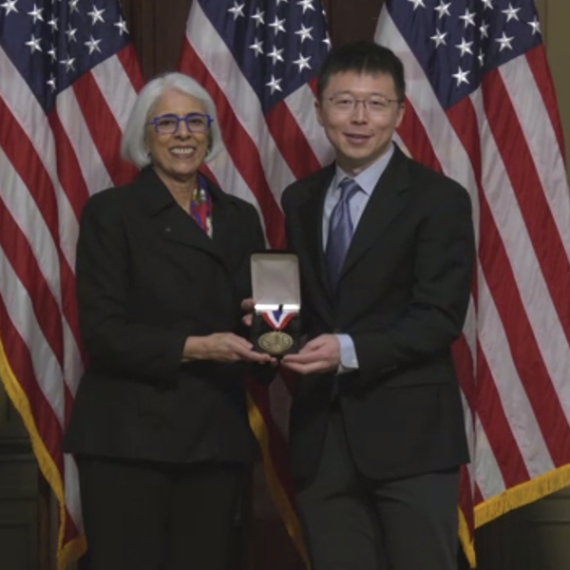Ann Graybiel wins 2018 Gruber Neuroscience Prize
MIT neuroscientist is recognized for her pioneering work on the complexity and function of the basal ganglia.

Institute Professor Ann Graybiel, a professor in the Department of Brain and Cognitive Sciences and member of MIT’s McGovern Institute for Brain Research, is being recognized by the Gruber Foundation for her work on the structure, organization, and function of the once-mysterious basal ganglia. She was awarded the prize alongside Okihide Hikosaka of the National Institute of Health’s National Eye Institute and Wolfram Schultz of the University of Cambridge in the U.K.
The basal ganglia have long been known to play a role in movement, and the work of Graybiel and others helped to extend their roles to cognition and emotion. Dysfunction in the basal ganglia has been linked to a host of disorders including Parkinson’s disease, Huntington’s disease, obsessive-compulsive disorder and attention-deficit hyperactivity disorder, and to depression and anxiety disorders. Graybiel’s research focuses on the circuits thought to underlie these disorders, and on how these circuits act to help us form habits in everyday life.
“We are delighted that Ann has been honored with the Gruber Neuroscience Prize,” says Robert Desimone, director of the McGovern Institute. “Ann’s work has truly elucidated the complexity and functional importance of these forebrain structures. Her work has driven the field forward in a fundamental fashion, and continues to do so.’
Graybiel’s research focuses broadly on the striatum, a hub in basal ganglia-based circuits that is linked to goal-directed actions and habits. Prior to her work, the striatum was considered to be a primitive forebrain region. Graybiel found that the striatum instead has a complex architecture consisting of specialized zones: striosomes and the surrounding matrix. Her group went on to relate these zones to function, finding that striosomes and matrix differentially influence behavior. Among other important findings, Graybiel has shown that striosomes are focal points in circuits that link mood-related cortical regions with the dopamine-containing neurons of the midbrain, which are implicated in learning and motivation and which undergo degeneration in Parkinson’s disorder and other clinical conditions. She and her group have shown that these regions are activated by drugs of abuse, and that they influence decision-making, including decisions that require weighing of costs and benefits.
Graybiel continues to drive the field forward, finding that striatal neurons spike in an accentuated fashion and ‘bookend’ the beginning and end of behavioral sequences in rodents and primates. This activity pattern suggests that the striatum demarcates useful behavioral sequences such, in the case of rodents, pressing levers or running down mazes to receive a reward. Additionally, she and her group worked on miniaturized tools for chemical sensing and delivery as part of a continued drive toward therapeutic intervention in collaboration with the laboratories of Robert Langer in the Department of Chemical Engineering and Michael Cima, in the Department of Materials Science and Engineering.
“My first thought was of our lab, and how fortunate I am to work with such talented and wonderful people,” says Graybiel. “I am deeply honored to be recognized by this prestigious award on behalf of our lab.”
The Gruber Foundation’s international prize program recognizes researchers in the areas of cosmology, neuroscience and genetics, and includes a cash award of $500,000 in each field. The medal given to award recipients also outlines the general mission of the foundation, “for the fundamental expansion of human knowledge,” and the prizes specifically honor those whose groundbreaking work fits into this paradigm.
Graybiel, a member of the MIT Class of 1971, has also previously been honored with the National Medal of Science, the Kavli Award, the James R. Killian Faculty Achievement Award at MIT, Woman Leader of Parkinson’s Science award from the Parkinson’s Disease Foundation, and has been recognized by the National Parkinson Foundation for her contributions to the understanding and treatment of Parkinson’s disease. Graybiel is a member of the National Academy of Sciences, the National Academy of Medicine, and the American Academy of Arts and Sciences.
The Gruber Neuroscience Prize will be presented in a ceremony at the annual meeting of the Society for Neuroscience in San Diego this coming November.




